| +++ Exciting choral works for the oncoming season +++ |
Dear musicians
Summer is just around the corner and you are no doubt already busy planning the next concert season with your choir.
We have put together a few suggestions for you in this newsletter.
Are you already familiar with the new completion of Mozart's Requiem by Michael Ostrzyga or perhaps you are still looking for an ideal work for the Christmas/ holiday season? Alternatively you might like to break new ground, take on a new role with your choir and perform Purcell's “Dido and Aeneas”?
Our choral programme is varied and certainly offers a number of possibilities for the new season.
You will find detailed information and music examples for all of our editions on our homepage. All products can be ordered directly via our webshop.
And please save the date of the chor.com. This international congress of the choir world takes place from 26 to 29 September in Hanover.
With kind regards,
Your international sales and marketing team |
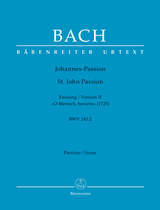 | Complete scholarly critical edition based on the Urtext from the “New Bach Edition – Revised” (NBArev)
Foreword in two languages (Ger/Eng) |
|
| Bach, Johann Sebastian | St. John Passion "O Mensch, bewein" BWV 245.2
Version II (1725) | BÄRENREITER URTEXT
Editor: Bärwald, Manuel | | BA 5938 | EUR 85.00 | Full score | 9790006543984 | Unlike Bach’s other oratorio compositions, there is no definitive version of the St. John Passion. The first version of 1724 which is today’s standard version represents a mixture of different readings. The second version of 1725 was performed under the direction of Bach himself and can therefore be considered authentic. In addition to a change in order of several movements, the second version differs from the earlier version by the use of the opening chorus “O Mensch, bewein”.
The performance material corresponds to the Urtext edition of Version II which was recently published as part of the “New Bach Edition – Revised” (NBArev). | | |
|
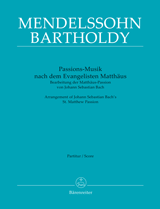 | Foreword in two languages (Eng/Ger)
Detailed Critical Commentary (Eng)
|
|
| Bach, Johann Sebastian | Passion Music after the Evangelist Matthew
Arrangement of Johann Sebastian Bach's St. Matthew Passion | | Editors: Bruno, Malcolm / Ritchie, Caroline | Arranger: Mendelssohn Bartholdy, Felix | | BA 11308 | EUR 98.00 | Full score | 9790006567683 | This new Bärenreiter edition returns to Mendelssohn’s unique vision of Bach’s masterpiece. By bringing together what Mendelssohn had sketched and including supplements to certain parts by the editor, the work is now presented in its reduced form, with the revised part for the Evangelist (in the secco recitatives with orchestral accompaniment), with clarinets replacing the oboe d’amore, and with a suggestion for the missing continuo part (which had been begun for the Thomaskirche organ but remained unfinished or was lost).
The new edition shows not only Mendelssohn’s imaginative reinterpretation of the original, but also the versatility of Bach’s music in his hands. In an age in which Bach is played almost exclusively by Baroque ensembles, it allows them the opportunity to perform one of Bach’s greatest works from a 19th century perspective. | | |
|
 | The organ version includes violoncello and double bass parts edited for the first time
Foreword (Eng/Cz/Ger) and Critical Commentary (Eng) by the editor |
|
Dvorák, Antonín
| Mass in D major op. 86
Organ version | BÄRENREITER URTEXT
Editor: Utidjian, Haig | | BA10434 | EUR 19.95 | Full score | 9790260108523 | Dvorák composed the “Mass in D major” in 1887 at the suggestion of his patron Josef Hlávka for the inauguration of the Lužany castle chapel. It is written for choir and organ with sporadic passages for soloists, uses simple expressive devices and makes light technical demands. Thus, this work is easy to perform, also by amateur church choirs; all that is needed is a small choir and the solo parts can be sung by members of the choir.
The full score includes an additional violoncello/double bass part edited for the first time. Dvorak himself had written this additional part into a copy of the organ version. |
|
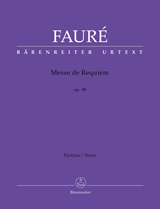 | High-quality Urtext edition based on the “Complete works of Gabriel Fauré”
First systematic evaluation of all sources
Based on the large orchestral version of 1900
Vocal score suitable for all versions of the Requiem |
|
| Fauré, Gabriel | Messe de Requiem op. 48 N 97b
Version of 1900 | BÄRENREITER URTEXT
Editors: Stahl, Christina M. / Stegemann, Michael | | BA 9461 | EUR 70.00 | Full score| 9790006540105 | The “Messe de Requiem” is probably the internationally best-known and most frequently performed work by Gabriel Fauré . The composer’s first version was limited to just five movements and small-scale forces with low strings, harp and organ. The work was then expanded several times culminating in the version for large orchestra of 1900. This orchestral version forms the basis of this edition.
Despite its comparatively long period of gestation, the Requiem forms a stylistic unity. Unlike other requiem settings, the composer foregoes any theatrical gestures in this work. A restrained dynamic range together with graceful melodic writing for both soloists and choir give the work a gentle and optimistic character.
The vocal score is based on the volume of the “ Complete Works of Gabriel Fauré ” (BA 9461-01) published in 2010. It is important to note that this vocal score is also compatible with the first small-scale version as well as the second chamber orchestra version. | | |
|
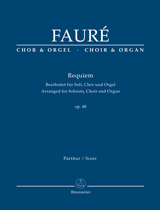 | Standard work from concert repertoire
Easy-to-play organ arrangement
Impressive timbral adaptation for organ
|
|
| Fauré, Gabriel | | Requiem op. 48 | Arranged for soloists, choir and organ
Editor: Bredenbach, Ingo | | BA 7513 | EUR 13.95 | Score | 9790006521654 | Thanks to its transparent texture and its many beautiful melodies, which seem to be a token of the composer’s highly personal relation to death, the Requiem is perhaps Fauré’s most popular work.
The musical structure of this frequently heard piece makes it virtually ideal for performance with organ accompaniment. This arrangement takes into account all three of the composer’s surviving versions: the early version with string orchestra as well as the two later versions with added winds and with symphony orchestra. |
|
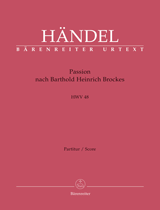 | Based on the “Halle Handel Edition”
Newly-engraved conducting score, vocal score and orchestral parts |
|
| Handel, George Frideric | | Passion nach Barthold Heinrich Brockes HWV 48 | BÄRENREITER URTEXT
Editor: Schroeder, Felix | | BA 11311 | EUR 81.00 | Full score | 9790006574650 | Handel composed his only oratorio in German between 1716 and 1717 basing it on the then popular Passion text by Barthold Heinrich Brockes entitled “Der für die Sünde der Welt gemarterte und sterbende Jesus” (“The Story of Jesus, Suffering and Dying for the Sins of the World”). Handel’s affinity to opera is evident in the musical realisation of the emphatic text as he creates a synthesis between traditional Protestant church music and the depiction of human passion in the manner of opera seria.
This edition is based on the corresponding volume of the “Halle Handel Edition” (BA 4021). The full score, parts and vocal score have been newly engraved. The piano reduction has been simplified and brought up to today’s standards, thus making it much more manageable to play.
The performance material is available on hire. | | |
|
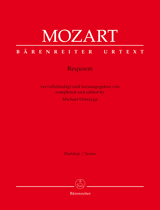 | Scholarly-critical edition of the “Requiem” fragment
Missing sections were completed by drawing from other fragmentary sacred works by Mozart
Added or completed sections incorporate influences from Bach and Handel already detectable in the fragment
Alternative performance options for the “Lacrimosa”, “Sanctus” and “Benedictus”
Extensive foreword (Ger/Eng) on the work’s history, reception and modern completions, with analytical stylistic critique
Detailed Critical Commentary (Eng), partly available on the Bärenreiter website |
|
| Mozart, Wolfgang Amadeus / Ostrzyga, Michael | Requiem
New Completion | BÄRENREITER URTEXT
Editor: Ostrzyga, Michael | | BA 11310 | EUR 69.00 | Full score | 9790006569199 | This publication offers a source-critical edition of Mozart’s fragmentary “Requiem” as well as an alternative to the traditional Süßmayr version. It makes it possible to perform 1) the fragment, identified in print in both the score and the parts, 2) the authentic sections left incomplete by Mozart, now in a stylistically appropriate orchestration, and 3) those sections missing entirely in the fragment, newly added in Mozart’s idiom taking into account historical additions by Süßmayr and Eybler.
When completing the fragment, the editor drew on comprehensive comparative and analytical studies of Mozart’s church style and compositional workmanship. The influence of Handel and Bach manifested in his final years, particularly in the “Requiem” fragment, is taken into account in those sections requiring completion or fresh composition.
At two points readers may choose between alternative movements (or sections), since proceeding from Süßmayr’s historical version, two divergent options cannot be weighed against each other but each one may well reflect Mozart’s intentions: the “Lacrimosa” may end with or without “Amen” fugue, and the “Sanctus” may begin in the customary D major or in D minor. Above all, this makes it possible to retain the B-flat major “Hosanna” from Süßmayr’s autograph, a movement which, until now, has not been appreciated as compositionally flawless.
The edition is tried and tested on many occasions, e.g. at Harvard University, the Rheingau Music Festival, the Monadnock Music Festival (New Hampshire), in Salt Lake City (Utah), as well as in radio broadcasts (NDR, SWR, WDR) and CD recordings with Concerto Köln, Chorwerk Ruhr and Florian Helgath (“Le Disque classique du jour” from francemusique.fr and three nominations for Opus Klassik 2021 in the categories “Ensemble”, “Choral Recording” and “Editorial Achievement”) | | |
|
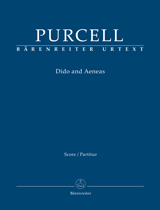 | Urtext edition based for the first time on the Tatton Park manuscript as the main source
Informative Foreword (Eng/Ger) on the genesis, transmission, reception and performance practice
Complete facsimile reproduction of the Chelsea libretto
|
|
| Purcell, Henry | | Dido and Aeneas | BÄRENREITER URTEXT
Editor: Shay, Robert | | BA 8744 | EUR 26.50 | Full score | 9790006563111 | The opera “Dido and Aeneas”, a recount of the well-known story from Book IV of Virgil's Aeneid, has established itself as a favourite with the public. This is due to the skill of composer Henry Purcell and his librettist Nahum Tate, who combined an overriding tragic theme with masterfully inserted comic episodes.
Long believed to have been conceived in 1689 for a performance at a “School for Young Gentlewomen”, scholars have debated the origins of “Dido” in recent decades, a process hampered by the lack of early musical sources. This edition addresses these challenges and evaluates the earliest sources that reproduce the opera in its surviving form. Surprisingly, these date from the 1770s and 80s, some ninety years after the work was written. Three key manuscripts – now held at the Bodleian Library in Oxford (UK), at Tatton Park Library which is a National Trust property near Manchester (UK), and at the Wakayama Prefectural Library (Japan) - were all copied from the same original, most likely a handwritten score from 1704 which reappeared in the early 1770s, only to disappear again.
This is the first "Dido" edition based on the Tatton Park manuscript as the main source. It was produced during the second half of the 18th century by Philip Hayes, one of England's most prominent musicians. He was known in musicology for his meticulous copies of Purcell's music, often from the autograph manuscripts. The Bodleian and Wakayama manuscripts are presented in a new light and their role in this edition has been reassessed accordingly.
The performance material is available on hire. | | |
|
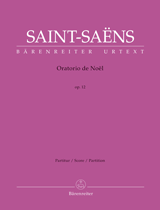 | New edition for the Saint-Saëns Anniversary Year 2021
Notes on Gallican pronunciation of the Latin text
|
|
| Saint-Saëns, Camille | | Oratorio de Noël op. 12 | BÄRENREITER URTEXT
Editor: Stahl, Christina M. | | BA 11304 | EUR 39.50 | Full score | 9790006566143 | Saint-Saëns was just 23 years old when he composed his “Oratorio de Noël” in 1858 in only twelve days. Edited by Christina M. Stahl, this choral masterpiece is now available in a comprehensive scholarly-critical Urtext edition.
In the Foreword (Ger/Eng/Fr), the editor explains the background to the premiere, explains the expansion of the work from six to ten movements as well as the composer’s multiple revisions. The Critical Commentary (Eng) meticulously records these revisions.
For the first time, valuable tips are provided for the Gallican pronunciation of the Latin text, customary in France until 1903.
The piano reduction is based on the contemporary arrangement by Saint-Saëns’ student Eugène Gigout. | | |
|
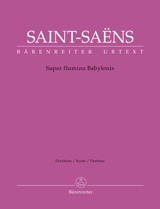 | First edition
Urtext edition of the first composition in music history with saxophone quartet
With valuable notes on performance practice, in particular on the Gallican pronunciation of the Latin text
|
|
| Saint-Saëns, Camille | | Super flumina Babylonis | BÄRENREITER URTEXT
Editor: Stahl, Christina M. | | BA 11305 | EUR 24.95 | Full score | 9790006567027 | Psalm 137, "Super flumina Babylonis", was an inspiration for many composers, including Camille Saint-Saëns. He repeatedly returned to his psalm motet for solo soprano, mixed choir, saxophone quartet, string orchestra and organ, originally composed in 1854. This first version in Latin – he composed a total of four versions – is available for the first time in a performing Urtext edition after careful consideration of all sources.
Saint-Saëns lived up to his reputation as an innovative composer by exploring the use of this family of instruments in sacred music just a few years after the invention of the saxophone. The successful combination of vocal parts and saxophone creates a special sound experience. |
|
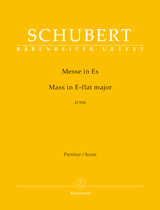 | Urtext edition based on the "New Schubert Edition"
Bilingual Foreword (Ger/Eng)
Precise reproduction of Schubert's differentiated articulation markings
|
|
| Schubert, Franz | | Mass in E-flat major D 950 | BÄRENREITER URTEXT
Editor: Faber, Rudolf | | BA 5576 | EUR 95.00 | Full score | 9790006575954 | During the last summer of his life, Franz Schubert completed the Mass in E-flat major D 950. The occasion for the composition of this Missa solemnis cannot be clarified with certainty. Schubert did not live to see the premiere of his sixth mass, which was first performed posthumously in 1829 under the baton of his brother Ferdinand.
Among other things, the editor has paid particular attention to the articulation. In order to be able to present Schuberts differentiated use of accents in the edition, a new symbol has been introduced: an accent which is flexible with regard to its length, thus making it possible to precisely visualize its compositionally intended duration.
| | |
|
   
Errors excepted; price changes and delivery terms subject to change without notice.
Responsible for content (i.S. des § 10 Abs. 3 MDStV): Ivan Dorenburg.
Your contact at Bärenreiter: Carolin Jetter · jetter@baerenreiter.com · Fax +49 (0)561 3105310 · Phone +49 (0)561 3105177
Bärenreiter-Verlag Karl Voetterle GmbH & Co. KG · Heinrich-Schütz-Allee 35-37 · 34131 Kassel · Germany
Managing Directors: Prof. h. c. Barbara Scheuch-Vötterle, Leonhard Scheuch, Clemens Scheuch
Firma und Registergericht: Kassel HR A 6553 · Komplementärin: Vötterle-Vermögensverwaltungs-GmbH Kassel HR B 3965
Umsatzsteuer-ID-Nr.: DE113096830
Unsubscribe
|
|
 |
|
|
|
|
|
|
|
|
|
|